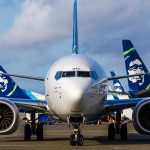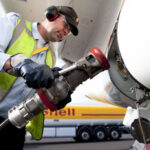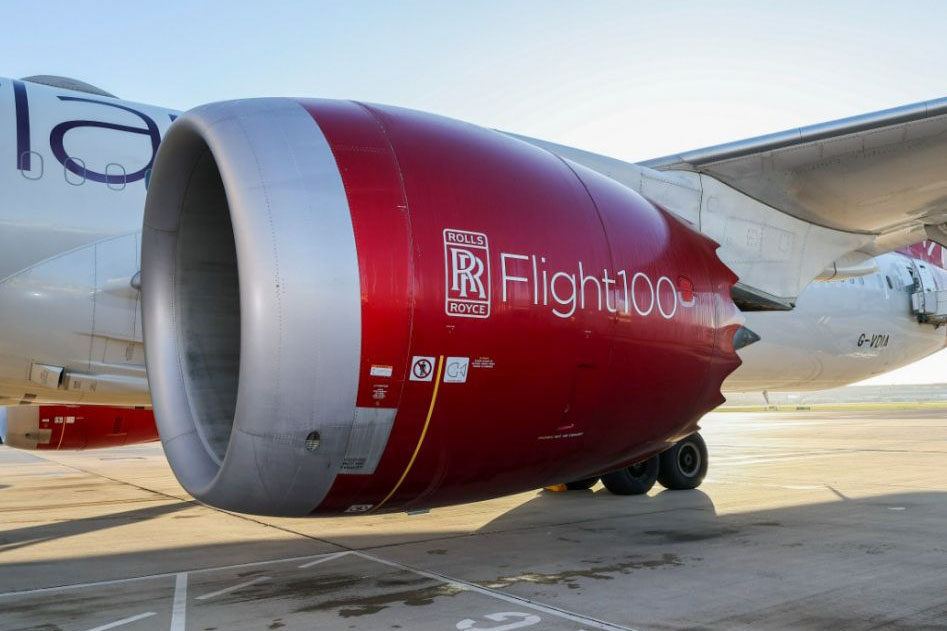The UK’s Advertising Standards Authority (ASA) has upheld complaints from five listeners to a radio ad broadcast just prior to Virgin Atlantic’s 100% SAF flight – dubbed Flight 100 – from London Heathrow to New York JFK on 28 November 2023. The complainants said the claim “100% sustainable aviation fuel” gave a misleading impression of the fuel’s environmental impact and challenged whether it could be substantiated. In a lengthy ruling, the ASA acknowledged the flight was to further research and understand the technical feasibility of using 100% SAF when current standards allowed only for a maximum blend of 50%, and acknowledged SAF was a universally recognised term, used by governments as well as industry. However, it said, a significant proportion of listeners would understand the “100% SAF” claim to mean the fuel used was “100% sustainable”, adding “the meaning of all terms used must be clear to consumers”.
Flight 100 was the result of a competition won by Virgin Atlantic that was run by the UK Department for Transport to “support industry to achieve the first net zero transatlantic flight on an aircraft using 100% sustainable aviation fuel within one year.”
According the ASA ruling, Virgin said an element of its competition bid was the intention that the flight would improve transparency and understanding around SAF and its environmental impacts for both the wider industry and the public. Consumers, they believed, would understand the fuel was made from sustainable sources, rather than being fossil fuel based.
“The ad did not claim that the fuel was 100% sustainable, nor did it give a misleading impression about the absolute or relative environmental nature, impact or credentials of sustainable aviation fuel (as compared to other aviation fuel). Rather, it factually described how the flight was powered exclusively by sustainable aviation fuel,” the ruling quotes Virgin’s response to the ASA.
After receiving notification from the ASA about the complaints, Virgin undertook a consumer survey to see what people understood from the ad. The airline claimed that overall, most listeners considered it easy to understand and the majority (68%) understood from the ad that SAF was better for the environment than traditional jet fuel, but that it was not without any adverse impact.
“Even if relevant information had been omitted from the ad, it was not ‘material’ information as referenced in the [the ASA’s BCAP] Code: that was information that consumers needed in context to make informed decisions about whether or how to buy a product or service,” said Virgin. “The ad did not advertise Virgin Atlantic’s products or services.”
In a further survey it had conducted since the ASA notification, Virgin identified that sustainability factors influenced only around 1.5% of consumer’s overall choice about long-haul airlines.
Upholding the complaints, the ASA said the survey confirmed the “limited knowledge and lack of clarity amongst consumers about the environmental impact of sustainable aviation fuel, both in general and specifically after listening to the ad.”
It added: “We considered most consumers were likely to be aware that aviation was a high carbon-emitting sector, due largely to its use of fossil derived aviation fuels, and would understand from the term sustainable aviation fuel that it had a less harmful impact on the environment than fossil derived aviation fuels. However, they were unlikely to be aware of the extent to which fuels described as sustainable aviation fuel still had negative environmental impacts, and in what ways. Those listeners who interpreted the claim “100% sustainable aviation fuel” to mean that the fuel was 100% sustainable were likely to expect that it had no negative environmental impacts at all.
“We therefore considered that in the absence information in the ad which explained that sustainable aviation fuel produced reduced, but still significant, emissions over its full lifecycle, including in-flight emissions, and which explained the ways in which the fuel otherwise significantly adversely impacted the environment, a significant proportion of listeners were likely to overestimate its environmental benefits.”
The ASA acknowledged the ad specifically highlighted Flight 100, which was a non-commercial flight for which listeners could not purchase tickets, but who could still build an overall impression that Virgin was committed to a “pioneering and challenging” role in working towards achieving a reduction in the environmental impact of aviation and that many listeners would seek out airlines that were taking such action.
“The ad specifically highlighted the use of sustainable aviation fuel in Flight 100 – a method by which a reduction in environmental impact could be achieved. We therefore considered that information about its limitations in that regard constituted material information that would have an impact on the transactional decisions of those listeners.
“We therefore concluded that the unqualified claim “100% sustainable aviation fuel” was misleading. The ad breached BCAP Code rules 3.1 and 3.2 (Misleading advertising), 9.2, 9.3 and 9.5 (Environmental claims).”
Responding to the findings, a Virgin Atlantic spokesperson told GreenAir: “While we are disappointed that the ASA has ruled in favour of a small number of complaints, we remain committed to open, accurate and transparent engagement on the challenge of decarbonisation.
“We’re committed to achieving net zero by 2050 and key to this will be using sustainable aviation fuel, which is one of the most immediate levers to decarbonising long-haul aviation. Flight 100 proved that SAF is a safe, 100% drop-in replacement for fossil fuel and while 100% adoption across every flight may be decades away, we demonstrated the radical collaboration required to drive increased production, supply and uptake in the UK.
“SAF is a term used globally by industry and governments for fossil-alternative aviation fuels that adhere to specific sustainability criteria. The radio advert for Flight 100 used SAF, and other factually accurate wording, to share that the flight would be operated as a single, non-commercial flight using 100% SAF.”
Virgin Atlantic is not the only airline to have been adjudged recently to have breached the UK’s ASA code on environmental claims. Last December, Air France, Lufthansa and Etihad Airways were ruled to have given a “misleading impression” of their environmental impact in separate advertisements, following intelligence gathering by ASA’s Active Ad Monitoring system.
In the case of Etihad, a paid-for Google ad used the words “Total peace of mind” alongside the words “Environmental advocacy”, which the ASA said could be understood by consumers to mean the airline actively worked to protect the environment and, consequently, consumers could use their services with “total peace of mind”, and was a misleading impression. Upon receiving notification of the ASA complaint, Etihad removed all references to “Environmental advocacy” from Google search ads delivered in the UK. The ASA also ruled against Etihad in April 2023 over the use of the words “sustainable aviation” in a Facebook ad, which it said the term would be understood in the aviation industry but not necessarily by the general public, to which the ad was aimed.
The December ruling against Lufthansa was also concerning a Google ad that included the callout “Fly more sustainably” in reference to the airline’s ‘Green fares’ option, under which 20% of flight-related CO2 emissions would be reduced by using sustainable aviation fuels. The ASA said the basis for the claim “Fly more sustainably” had not been made clear in the ad. Lufthansa removed this reference from future ads. Nine months earlier, the airline had another complaint against it upheld by the ASA over a poster with the headline “Connecting the world, protecting its future”.
The case against Air France also involved a Google ad aimed at the public, which stated “Air France is committed to protecting the environment: travel better and sustainably”. The ASA said this would be understood by consumers to mean the airline offered a sustainable and environmentally friendly way to travel by air. “We therefore expected to see a high level of evidence which demonstrated how Air France were protecting the environment and making aviation sustainable,” it stated. Unlike Etihad and Lufthansa, the ASA said Air France did not provide a “substantive” response to its enquiries.
Other airlines have faced greenwashing accusations elsewhere in Europe. In March, KLM lost a court case in the Netherlands, brought by environmental groups, which alleged the airline’s marketing breached the EU Unfair Commercial Practices Directive (see article). The judgment ruled that KLM’s claims suggesting flying can be or is becoming sustainable, as well as advertising suggesting the use of sustainable aviation fuels and carbon offsetting reduce or compensate for the climate impact of flying, “are misleading and therefore unlawful.”
In May, following a complaint by European consumer umbrella group BEUC, the European Commission and EU consumer authorities wrote to 20 European airlines over claims they were misleading consumers by informing them that the CO2 emissions caused by a flight could be offset by climate projects or through the use of SAF by paying additional fees (see article).
Photo: Virgin Atlantic’s Flight 100 was carried out on a Rolls-Royce-powered Boeing 787














More News & Features
SAF One announces new investment and technology partners for Middle East SAF project
New initiative formed to accelerate SAF adoption and production in the Pacific Northwest
EcoCeres opens new Malaysia production facility as SAF ambition in Asia scales up
Aviation, shipping and fuel leaders convene in Rotterdam to accelerate sustainable fuels scale-up
EU SAF mandates will have to be revised, predicts French oil chief
Lessons learned from the collapse of Fulcrum BioEnergy